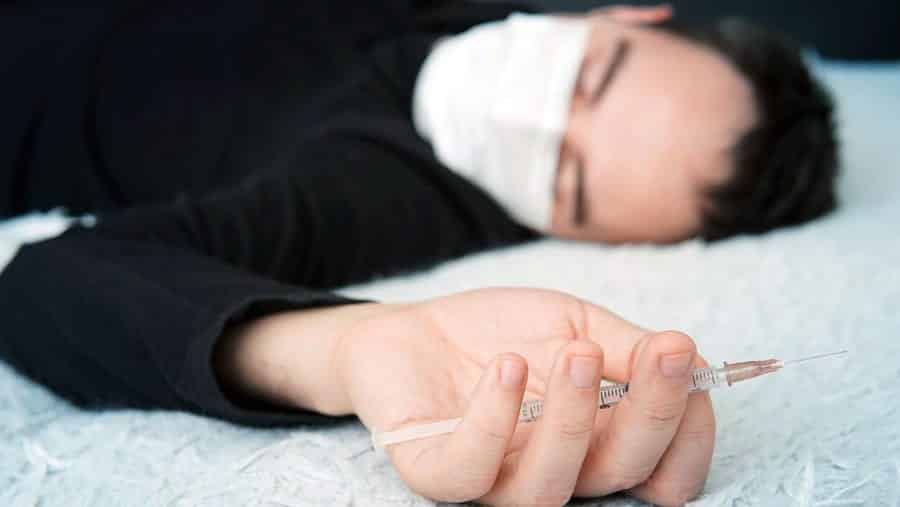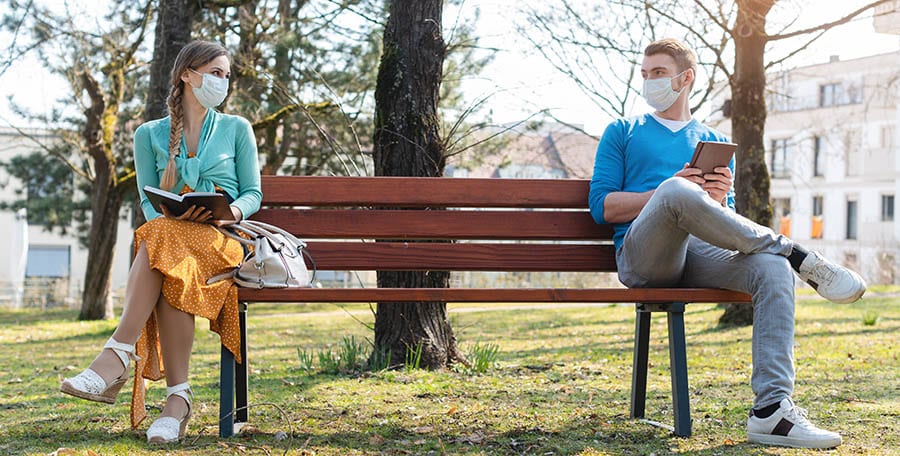During the midst of the COVID-19 global health crisis, many Americans are turning to alcohol and other drugs to pass the time and cope with stress. For example, alcohol sales in many states spiked since the beginning of the COVID-19 pandemic. Many communities are even allowing restaurant owners to include booze in to-go orders. Crazy, right?
Although this may be fun for some, it could definitely prove detrimental for others who have a predisposition to developing an addiction, whether that’s due to genetics or psychological conditions.

Now, information has been released that COVID-19 is correlated with a recent spike in opioid overdose numbers. According to the American Medical Association (AMA), they are “greatly concerned by an increasing number of reports from national, state and local media suggesting increases in opioid-related mortality—particularly from illicitly manufactured fentanyl and fentanyl analogs.”
For example, the Washington Post recently reported a suspected increase in overdoses by over 18% in March 2020, 29% in April 2020, and 42% in May 2020. At this point in time, over 35 states have reported an increase in opioid-related deaths. Not only this, but many inpatient rehab centers are struggling to remain open due to the need to quickly revamp their original treatment operations..
However, some addiction treatment providers, such as Hotel California by the Sea, remain open during COVID-19. During these troubled times, we’ve adapted many of our treatment modalities to fit the safety guidelines set forth by authoritative institutions for the novel coronavirus global health crisis. We understand the severity of addiction, and the importance of providing constant support to addicts during frightening times. Now, more than ever, it’s essential to seek treatment for a substance use disorder. Read on to learn why.
Hotel California by the Sea offers full-service detoxification, residential, and outpatient services during the COVID-19 pandemic.TREATMENT PROGRAMS
COVID-19 Could Lead To More Addiction-Related Deaths
Since early April, drug overdose rates have increased – and they don’t seem to be slowing down, either. Considering that, in 2018, over 67,367 people died from drug overdoses in the United States, the fact that the number of overdoses is estimated to be rising is a frightening prospect.
Even though the novel coronavirus is the most recent national concern, the opioid crisis is still raging heavily in the undercurrents of the United States. The US’ opioid epidemic isn’t stopping due to COVID-19 – if anything, it’s feeding off of it.
Increase in drug-related deaths from 2019 through the first portion of 2020
All data is provisional. Definitions of what counts as a drug-related death vary by state. Data for Arizona, California, Florida, Minnesota, Tennessee, Texas, Washington and Wisconsin includes only a subset of counties within each state. Source: The New York Times
COVID-19 Numbers Are Rising
Besides the fact that overdose rates are rising, COVID-19 numbers are still increasing in certain states, such as Utah, Tennessee, and Texas. Unfortunately, the stress of rising COVID-19 cases may deeply influence the mental health of the American population. Those who are extra stressed by this pandemic due to financial insecurity or grief may be more prone to developing an addiction or relapsing on drugs.
Addiction And The Immune System
There is a strong correlation between using drugs or alcohol and a decrease in immune system strength. Studies suggest that using drugs and drinking alcohol create immense inflammation in the body and can stress the body to dangerous extends. Inflammation in the body can lead to numerous deadly diseases. Researchers also recognize the strong correlation between drug use and an increased rate of bacterial and viral infections. Opiates and marijuana, especially, may be harmful.
Unemployment And Financial Insecurity
Stress can be a large trigger for those with a previous substance use disorder, or solely for the average person. Someone who has never struggled with drug or alcohol abuse may soon turn to alcohol or drugs to cope with financial losses or financial insecurity.
The US’s unemployment rate soared to 11.1% in June 2020, a high jump from the 3.7% unemployment rate in June of 2019. It’s no wonder that many Americans are suffering from poor mental health. Job loss is scary, and it’s okay to ask for help during this time.
Financial insecurity can take a massive toll on any individual. Add on top of that a global health pandemic, and you’ll get a recipe for disaster.
USA Unemployment Rate
Source: U.S. Bureau of Labor Statistics
Less Face-To-Face Contact
If anything, the rising numbers of opioid overdoses and increased alcohol sales may shed light on one crucial fact: the opposite of addiction may be as much about human connection as it is about sobriety.
A large part of recovering from substance use disorders includes developing deep, healthy, and fulfilling relationships. Through these relationships, people suffering from drug addiction and alcoholism can discuss their goals and accomplishments and remain accountable to them. Unfortunately, social distancing measures are keeping many people at home. Additionally, these social distancing measures don’t seem as though they’ll be lifted anytime soon.

For people in recovery from an opioid use disorder or another substance use disorder, this is a dangerous proposition. To recover from drug abuse or alcoholism, addicts and alcoholics must be able to connect with each other to share their struggles, joys, and triumphs in recovery.
Without this important face-to-face contact with peers, it’s harder for people in recovery from addiction to stay accountable to themselves and others. It may be easier to relapse on drugs or alcohol and hide a relapse from home. Therefore, inpatient treatment for drug addiction and alcoholism is crucial.
Opioid Withdrawal Symptoms Vs. COVID-19 Symptoms
Depending on someone’s drug of choice, detoxing alone can be dangerous. One concern about addicts detoxing during COVID-19 is the possible confusion that could arise between many drug withdrawal symptoms and symptoms of the novel coronavirus.
For example, many opioid withdrawal symptoms are similar to symptoms of COVID-19. Many people who detox from opioids tend to experience flu-like symptoms like nausea, vomiting, and chills. If someone detoxes from an opioid and happens to catch COVID-19, they may seek treatment for this virus later than if they weren’t withdrawing due to this overlap in symptoms.
Addiction is a dangerous disease, just like COVID-19. Combined, they’re a frightening force that must be fought through proper treatment. Hotel California by the Sea understands this.
What To Do Next:
Unfortunately, the amount of drug overdoses seems to be exacerbated by the limited resources available to many people suffering from mental health conditions. Both the COVID-19 pandemic and the opioid crisis are public health threats.
If you’re currently struggling with addiction during COVID-19, you still have options. Despite limits placed on many industries, rehab centers across the nation are working hard to keep saving lives.
Inpatient Addiction Treatment Facilities
Addiction treatment can help prevent the spread of COVID-19.
While addicts are addicted to their drug of choice, they may go to significantly risky measures to attain their drug of choice. Add on top of this a global health pandemic, and you’ll get an even higher amount of danger.
For example, to attain drugs, a person struggling with a substance use disorder may break social distancing guidelines to meet with a drug dealer. In inpatient rehab, addiction treatment providers directly help the spread of COVID-19 by helping addicts stay in a safe and contained area.
It’s crucial that to prevent the spread of COVID-19, Americans follow the guidelines set forth by the Centers for Disease Control and Prevention. Our inpatient drug rehab center in Southern California understands this.
Other Means Of Treatment
If for any reason, you can’t attend addiction treatment, there are other options to help you recover (or stay recovered) from a substance use disorder. For example, many healthcare providers are offering telehealth services to people worldwide who need help during COVID-19.

There are also several other helpful tools available to those who may not be able to make it to an inpatient rehab center. For example, many AA meetings and other 12-step groups recently began offering online meetings for addicts and alcoholics who would like support from home. Additionally, many therapists and psychiatrists are now offering online consultations and appointments.
How Inpatient Drug Treatment Can Help Coronavirus Pandemic
Hotel California by the Sea is currently taking several measures to address the dangers of the coronavirus pandemic. We’re treating this virus seriously and doing everything possible to ensure our clients’ overall safety while also managing their addictions. Daily, we fight to prevent overdose deaths, relapse, and the disease of addiction.
Although it’s too late to prevent the development of COVID-19, it isn’t too late to seek help for your substance use disorder. Reach out to our admissions specialists today to find out more about how you can safely find freedom from addiction during the COVID-19 global health pandemic.
